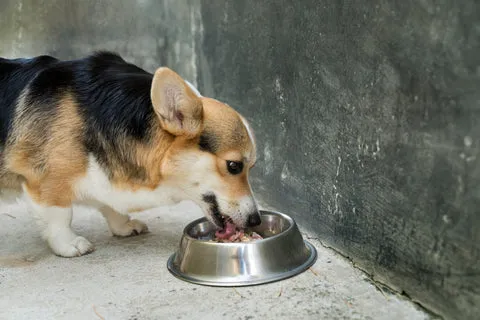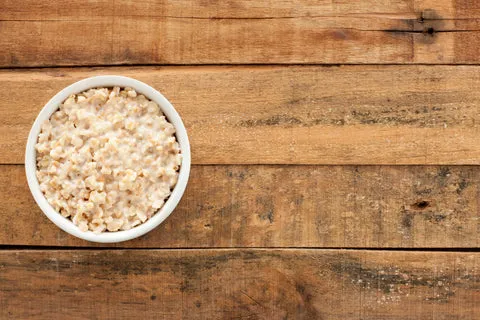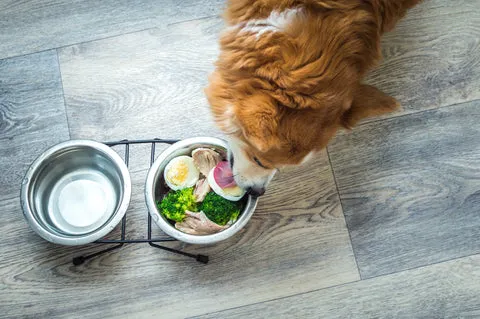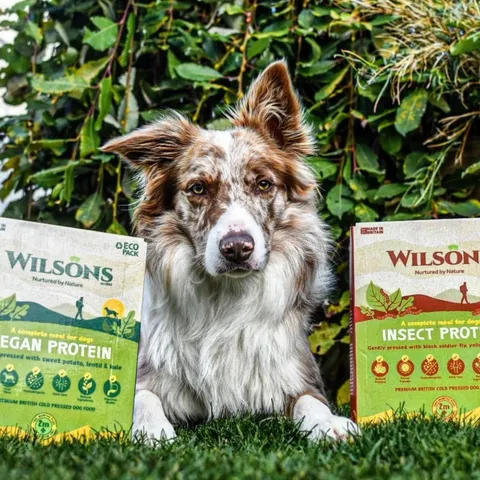When your beloved canine companion is unwell, one of the most pressing concerns is understanding what to feed a sick dog. Just like humans, dogs often lose their appetite when they’re not feeling their best, whether due to an upset stomach or general malaise. Providing the right nutrition during these times is crucial for boosting their energy levels and supporting a speedy recovery. This guide delves into the best food options for dogs experiencing digestive upset and explores beneficial choices for dogs with allergies or a predisposition to sensitive stomachs. We’ve partnered with veterinary and pet nutrition experts to offer a comprehensive look at nurturing your furry friend back to health.
Feeding a Sick Dog: Nourishing Your Companion Back to Health
It’s completely natural to feel anxious about your dog’s diet when they’re sick. The golden rule for a dog with an upset stomach is to stick to a plain, bland, and highly nutritious diet. Being prepared with a selection of easily digestible, wholesome foods can make a significant difference when your dog’s health takes an unexpected turn. Remember, if your dog’s symptoms persist or worsen, it’s always best to consult your veterinarian for professional advice. Here are ten of the most effective and nutrient-dense options to consider for a sick dog:
 Dog food in a bowl
Dog food in a bowl
1. Plain Boiled White Meat
Simple, lean white meats like chicken or turkey breast are excellent choices for a sick dog because they are low in fat and easy to digest. These protein sources can help to soothe an unsettled stomach. It’s essential to remove all skin and bones before preparing the meat to prevent choking hazards and ensure easier digestion.
To prepare:
- Rinse the meat thoroughly under cold water.
- Trim off any excess fat, skin, or bones.
- Place the meat in a pot, cover with water, and bring to a boil. Reduce heat and simmer for 15-20 minutes until cooked through.
- Drain the water and cut the cooked meat into small, bite-sized pieces.
- Allow the meat to cool completely before serving, either on its own or with a small portion of plain white rice or cooked vegetables.
2. White Rice
White and brown rice are common components in many dog foods, and for good reason. While brown rice offers more nutrients, the blandness of white rice makes it a gentler option for a sick dog, as it’s easier for their digestive system to process. White rice can also be beneficial in cases of diarrhea, as its binding properties can help normalize stools.
To prepare:
- Rinse the rice under cold water.
- Combine rice and water in a large pot, using a ratio of two parts water to one part rice.
- Bring to a boil, adding a pinch of salt.
- Reduce heat to a simmer, cover the pot, and cook for approximately 18 minutes, or until all the water has been absorbed.
- Let the rice rest and cool before fluffing with a fork and serving.
 Dachshund eating rice
Dachshund eating rice
3. Cooked Sweet Potatoes
Plain, cooked sweet potatoes are a powerhouse of vitamins and fiber, making them incredibly gentle on a dog’s stomach and intestines. They contribute essential nutrients like calcium, iron, and magnesium, supporting overall health.
Avoid feeding raw sweet potatoes, as they are difficult to digest and can exacerbate stomach issues. Instead, peel and chop the sweet potatoes into chunks, boil until tender, then drain and mash them. Ensure they are completely cooled before offering them to your dog.
 Sweet potato slices
Sweet potato slices
4. Pumpkin Puree
Similar to sweet potatoes, pumpkin is highly effective in aiding digestion and alleviating an upset stomach. Its rich vitamin content boosts the immune system, while its high fiber helps regulate the digestive tract.
Offer your dog up to four tablespoons of plain, canned pumpkin with their regular meal or alongside their chicken and rice. It’s crucial to use 100% pure pumpkin with no added sugar, seasonings, or other ingredients, as these can further irritate their stomach. Avoid pumpkin pie filling or any spiced varieties.
 Pug with a pumpkin slice
Pug with a pumpkin slice
5. Homemade Bone Broth
Bone broth is a fantastic source of hydration and essential nutrients like sodium and potassium, which are vital for sick dogs. It’s low in carbohydrates and gentle on the digestive system.
When preparing bone broth for your dog, avoid using garlic or excessive salt, as these can cause further upset.
To prepare:
- Add beef or pork marrow bones and chicken or turkey bones to a large cooking pot.
- Cover with a few inches of water and cook on low heat for 20-24 hours.
- Strain the liquid to remove bones, then serve the broth once it has cooled.
 Golden Retriever puppy drinking broth
Golden Retriever puppy drinking broth
6. Stage 2 Baby Food (Meat-Based)
For puppies or smaller dogs experiencing stomach issues, stage 2 meat-based baby foods (such as chicken, lamb, or turkey) can be a palatable and easily digestible option.
When selecting baby food, always check the ingredients list and avoid any that contain garlic or onion powder, as these are toxic to dogs. Baby food is easy to chew and digest, making it helpful for treating stomach upset and diarrhea. If you are unsure about any ingredients, consult your veterinarian.
 Dachshund puppies eating from a plate
Dachshund puppies eating from a plate
7. Poached Fish
Fish is an excellent source of healthy fats and vitamins, beneficial for your dog’s immune system and recovery. Its strong aroma can also entice a reluctant eater back to their food bowl.
The best way to prepare fish for a sick dog is by poaching. Add the fish to a pan of water, bring to a boil, then reduce heat and simmer for 10-15 minutes until cooked. Ensure all bones are removed, and cut the fish into small pieces before serving.
 Corgi eating fish
Corgi eating fish
8. Plain Cooked Oatmeal
Plain, cooked oatmeal made from rolled oats can help calm an upset stomach. Its high fiber content can aid in cases of constipation and it contains antioxidants that may help reduce inflammation in the stomach.
However, it’s important not to overfeed oatmeal. Too much fiber can potentially worsen digestive discomfort. Use it sparingly as part of a balanced bland diet.
 Bowl of oatmeal
Bowl of oatmeal
9. Plain Yogurt
Plain, unsweetened yogurt that contains live and active cultures (probiotics) is beneficial for a dog’s digestive health. Probiotics aid in digestion and can help regulate the gut, especially for dogs experiencing constipation.
Choose natural, plain yogurt from your local store. It’s an easily accessible option and can even be frozen into small portions for a cooling treat on warmer days. Always ensure it contains no artificial sweeteners or flavorings.
 Puppy with yogurt on its face
Puppy with yogurt on its face
10. Eggs
Provided your dog is not actively vomiting, cooked eggs can be an excellent food choice. They are gentle on the stomach and provide a good source of protein, which can help boost energy levels after an illness.
Scrambled eggs cooked without butter or oil, or simply boiled eggs, are the most stomach-friendly preparations. If your dog is experiencing vomiting, it’s best to avoid eggs altogether until their condition improves.
 Dog eating eggs and vegetables
Dog eating eggs and vegetables
What to Feed a Dog with Allergies or Chronic Upset Stomachs
If your dog frequently suffers from digestive issues or is prone to sickness, it might indicate underlying food allergies or sensitivities. Consulting with your veterinarian is the first step to identifying potential causes, whether they are ingredient-specific or breed-related.
For dogs with recurring upset stomachs, exploring specialized diets can be highly beneficial. Many owners find that high-quality, minimally processed foods are easier for their dogs to digest.
Cold-Pressed Dog Food
Cold-pressed dog food is a superior alternative to traditional kibble, especially for dogs with food sensitivities. This method involves minimal processing at lower temperatures, which helps preserve the nutritional integrity of the ingredients.
 Dog with cold pressed food
Dog with cold pressed food
The resulting food is easily broken down by a dog’s digestive system, making it ideal for sensitive stomachs. Cold-pressed foods often aid digestion and break down at a rate comparable to raw food, allowing for easier integration into a mixed diet if necessary. Available in various flavors, including options like white fish, salmon, and chicken, and with grain-free varieties, cold-pressed dog food offers a nutritionally dense choice that minimizes the risk of digestive upset.
Insect Protein Cold-Pressed Dog Food
This complete and nutritionally balanced option is processed using the same low-temperature method as other cold-pressed foods, ensuring maximum nutrient retention and digestibility.
Insects are an excellent source of protein, often containing more than traditional meats like chicken or beef, so your dog won’t miss out on essential nutrients. Furthermore, insects are naturally hypoallergenic and low in purines, making them an excellent choice for dogs with protein sensitivities or meat-related allergies. Like other cold-pressed foods, insect protein varieties break down easily and can be fed as a standalone diet or alongside raw food.
 Dog with insect protein food
Dog with insect protein food
Raw Frozen Dog Food
For dogs that are particularly fussy or sensitive to commercial kibble, transitioning to a raw food diet can be a game-changer. Raw food diets at Wilsons are made with natural ingredients that undergo minimal processing and are typically grain-free, which significantly aids digestion and can improve skin and coat health.
 Dog eating raw food
Dog eating raw food
These diets often come in specific ratios, such as an 80/10/10 mix of meat, offal, and bone, or a 70/10/10/10 blend with added vitamins and minerals. This allows owners to customize their dog’s diet to meet specific allergy needs, potentially by adding their own carefully selected vegetables and minerals.
When your dog is feeling unwell, providing them with easily digestible, nutrient-rich food is paramount. By understanding what to feed a sick dog, you can play an active role in their recovery and overall well-being. Always remember to consult your veterinarian for personalized advice and to address any serious health concerns.
